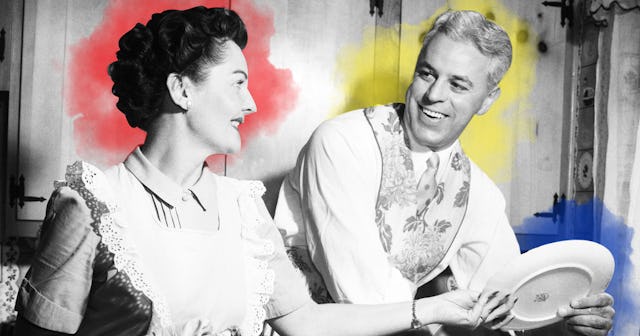If Chore Equity Is The Goal, Then We Can’t Micromanage Our Spouse (AKA Stop Micromanaging Your Spouse Already)

Let me just start by saying that there is a right and a less-right way to do the laundry. As long as the clothes are clean, there can’t really be a “wrong” way, right? But there is most definitely a less-right way, and it all comes down to folding.
I fold the laundry the right way. My husband folds laundry the less-right way. But you know what? Whenever he does the laundry, I am learning to zip it about the less-right way because you know what’s worse than laundry that is folded the less-right way? Laundry that you have to do yourself.
The other week, my husband returned from his weekly grocery shopping (or bi-monthly, now that we’re in quarantine and the grocery store feels like it’s teeming with germs) and I may have greeted him with some sighs and more than a few “recommendations” about how to do the grocery shopping. I quickly realized, though, that when your spouse is the one gearing up in a hazmat suit to get food for your family, it is not the time to remind him that we don’t need four boxes of Pop-Tarts or that the kids don’t like chunky peanut butter. (Also my husband regularly does the grocery shopping and is very capable of accomplishing this task without input.)
I’m learning the hard way that if I want my husband to share in the household chores and emotional labor of running a family, it doesn’t help to criticize or nit-pick. (I say “learning,” because…well, old habits die hard.)
It goes both ways too. My husband prefers to do the cooking – and does a much better job of it, I might add – but whenever I make dinner, he knows not to complain that the pot pie was left in the oven a few minutes too long or that the broccoli is a little overcooked. Why? Because he’s not an asshole and that’s a surefire way to have dinner consist of cereal and toast for several nights in a row.
I think we can all agree that sharing in household responsibilities is the goal. Nonetheless, the Bureau of Labor Statistics’ 2018 American Time Use Survey found that women in heterosexual relationships spend an average of nearly 50% more time each day on household activities and childcare than their male partners.
It’s important to note that chore equity doesn’t mean equality. “Equity means that you perceive the division of labor as being fair,” University of Alberta social scientist Adam Galovan, PhDd told Experience Life. “People have different responsibilities in their lives, so the question is: How do they balance that in a way that they both agree on? It doesn’t have to be exactly 50-50.”
So, no, you don’t need to do a tit-for-tat list of household chores, and I can assure you that keeping score is a great way to accomplish nothing but resentment. (Another lesson learned the hard way.) Nothing is even-Steven all the time, and we all have different strengths and weaknesses. For instance, my husband does a much better job of helping our kids with school work, but I do a better job of loading the dishwasher. He enjoys grocery shopping and cooking; I loathe both things. I hate clutter and like to make the bed first thing in the morning, so I tackle those things. We both dislike home improvement projects so we try to outsource those or do them together (misery loves company, after all). The key is that neither partner feels like they are carrying more of the burdens of raising a family and running a household than the other partner.
Another surefire way to hinder chore equity and ensure that you shoulder most of the burden of running the household yourself is to constantly nitpick, to have unrealistic standards, and to expect your partner to do things “your way.” Of course, this doesn’t mean you need to be a pushover who’s grateful for any half-ass job your partner does around the house. What it does mean is we need to remember that there’s more than one way to get things done. As long as you agree on some general goals for your family, you can cut each other some slack. In other words, heed my warning: do not – I repeat do not – harp on your spouse about the less-right way to fold laundry. (Seriously, just don’t.)
So stop micromanaging. Stop complaining. Stop nitpicking and making “recommendations.” Your partner is a full-fledged adult – one who you thought would make a good co-partner in this wild ride called raising a family and sharing a household – so let them act like it. He isn’t a child who needs to be taught; that’s just demeaning to both of you. So step aside. Bite your tongue. And let your husband act like the grown-up that he is.
Like I said, I’m learning. I’m reminding myself to keep my mouth shut when I might have done something differently. And as a result, I’m appreciating the liberation (and added time) that comes from not having to “do it all.”
Damn, chore equity feels good – even better than towels that are folded in the tri-fold method (i.e. the “right” way).
This article was originally published on